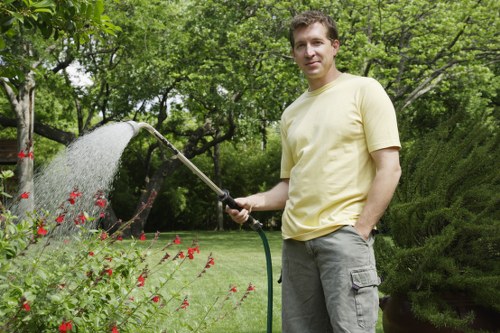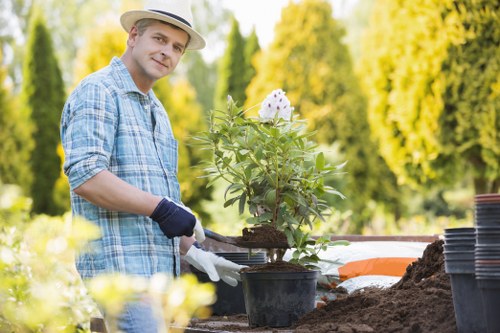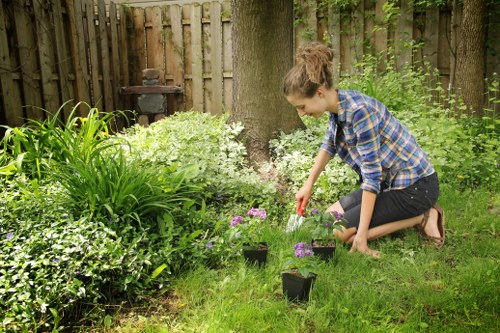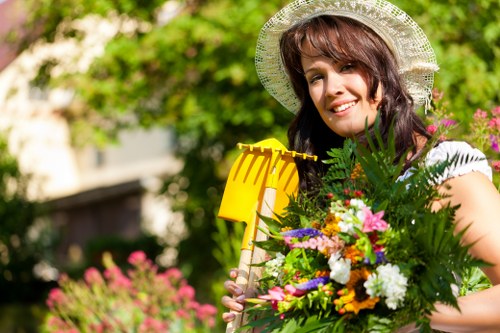Gardening in Carnegie

Gardening in Carnegie offers a unique blend of challenges and rewards for both novice and experienced gardeners. Nestled in a region with a temperate climate, Carnegie provides the perfect environment for a diverse range of plants and flowers to thrive. Whether you're looking to cultivate a vibrant flower bed, maintain a lush lawn, or grow your own vegetables, understanding the local conditions and best practices is essential for success.
The community in Carnegie highly values green spaces, making it an ideal place for gardening enthusiasts to connect and share tips. The local gardening clubs and community gardens provide excellent opportunities to learn from others, exchange ideas, and participate in gardening events throughout the year.
One of the first steps in successful gardening is assessing your garden space. Carnegie's varied landscape includes everything from flat, open areas to sloping terrains. Each type of space requires different planning and techniques to ensure that your garden not only survives but flourishes.
Climate and Soil in Carnegie

Understanding the climate and soil conditions in Carnegie is crucial for selecting the right plants and implementing effective gardening strategies. Carnegie experiences a **moderate climate** with four distinct seasons, including hot summers and cold winters. This seasonal variation influences plant growth cycles and demands careful planning to ensure year-round garden health.
The soil in Carnegie varies significantly from one area to another. Some regions boast rich, loamy soil, while others have sandy or clay-heavy compositions. Conducting a soil test can help determine the pH levels and nutrient content, allowing gardeners to amend the soil appropriately for optimal plant growth.
Rainfall in Carnegie is generally well-distributed throughout the year, but gardeners should still implement proper irrigation systems to manage water usage efficiently. Drip irrigation and rainwater harvesting are popular methods that not only conserve water but also provide plants with the consistent moisture they need.
Best Plants for Carnegie Gardens

Choosing the right plants is a fundamental aspect of gardening in Carnegie. **Native plants** are particularly well-suited to the local environment, as they are adapted to the climate and soil conditions. Some popular choices include:
- Echinacea: Known for its vibrant blooms and drought resistance.
- Lavender: Offers a pleasant fragrance and attracts pollinators.
- Hostas: Ideal for shaded areas, providing lush foliage.
- Tomatoes: A favorite for vegetable gardens, thriving in Carnegie’s summer heat.
- Roses: Classic flowers that can be cultivated in various soil types.
In addition to native species, many ornamental plants and vegetables perform well in Carnegie’s climate. It's essential to consider factors such as sunlight exposure, soil type, and water availability when selecting plants to ensure they reach their full potential.
For those interested in **vegetable gardening**, crops like lettuce, spinach, carrots, and peppers are excellent choices. These vegetables can be grown in raised beds or containers, providing flexibility and ease of maintenance.
Gardening Tips and Techniques

Implementing effective gardening techniques can significantly enhance the productivity and beauty of your Carnegie garden. Here are some essential tips to consider:
- Soil Preparation: Prior to planting, enrich your soil with organic matter such as compost or well-rotted manure. This improves soil structure, fertility, and drainage.
- Planting Schedule: Adhere to a planting calendar that aligns with Carnegie’s seasonal changes. Early spring and late summer are ideal times for planting most annuals and perennials.
- Pruning and Maintenance: Regular pruning helps maintain plant health and encourages robust growth. Remove dead or diseased branches promptly to prevent the spread of pests.
- Weed Control: Keep your garden free of weeds by employing mulch, which suppresses weed growth and retains soil moisture.
- Pest Management: Use integrated pest management (IPM) strategies that combine biological, cultural, and mechanical controls to minimize pest damage.
Additionally, adopting **companion planting** techniques can enhance plant growth and reduce the need for chemical fertilizers and pesticides. By strategically pairing complementary plants, you can create a more resilient and productive garden ecosystem.
Efficient water management is also key. Consider installing a rainwater collection system to supplement your garden’s water supply, especially during dry spells. Drip irrigation systems are highly effective in delivering water directly to plant roots, minimizing evaporation and waste.
Sustainable Gardening Practices

Sustainability is increasingly important in modern gardening practices. By adopting eco-friendly methods, gardeners in Carnegie can contribute to environmental conservation while maintaining healthy gardens. Here are some sustainable practices to consider:
- Composting: Recycle kitchen scraps and garden waste into nutrient-rich compost, which can enhance soil fertility and reduce landfill waste.
- Rainwater Harvesting: Collect and store rainwater to use for irrigation, conserving precious water resources.
- Organic Gardening: Avoid synthetic fertilizers and pesticides by using natural alternatives that protect beneficial insects and soil health.
- Native Plant Selection: Incorporate native plants into your garden design to support local biodiversity and reduce maintenance needs.
- Energy-Efficient Tools: Utilize manual or battery-operated gardening tools to minimize energy consumption and reduce greenhouse gas emissions.
Implementing these practices not only benefits the environment but also promotes a healthier and more resilient garden. Sustainable gardening can lead to long-term savings, improved soil quality, and a more vibrant ecosystem.
Moreover, practicing crop rotation in vegetable gardens can prevent soil depletion and reduce the occurrence of pests and diseases. By rotating plant families each season, you maintain soil nutrient balance and disrupt pest life cycles.
Gardening Services in Carnegie

For those who prefer professional assistance, Carnegie offers a variety of gardening services tailored to different needs and budgets. Professional gardeners can provide expertise in landscape design, plant selection, maintenance, and more. Here are some common services available:
- Landscape Design: Creating aesthetically pleasing and functional garden layouts that complement your property.
- Lawn Care: Services include mowing, fertilizing, aerating, and pest control to maintain a healthy and attractive lawn.
- Plant Installation: Professional installation of trees, shrubs, flowers, and vegetable gardens, ensuring proper placement and growth conditions.
- Seasonal Maintenance: Preparing gardens for different seasons through tasks like pruning, mulching, and winterizing plants.
- Irrigation Services: Designing and installing efficient irrigation systems to optimize water usage and plant health.
Hiring a local gardening service ensures that the professionals are familiar with Carnegie’s climate and soil conditions, allowing them to offer tailored solutions that meet your specific gardening needs. Whether you require a one-time project or ongoing maintenance, there are services available to support your gardening endeavors.
Additionally, many gardening services in Carnegie offer eco-friendly options, aligning with sustainable gardening practices. From organic lawn care to native plant installations, these services help you create a garden that is both beautiful and environmentally responsible.
Nearby Areas for Gardening Services

Carnegie is surrounded by several vibrant communities, each offering unique features and excellent gardening services. Here are some of the closest areas to Carnegie that you might consider for gardening needs:
- Piedmont: Located just a short drive from Carnegie, Piedmont is known for its lush parks and community gardens, making it a hub for gardening enthusiasts.
- Dover: Dover offers a variety of gardening centers and nurseries, providing a wide selection of plants and gardening supplies.
- East Lake: This area boasts beautiful residential gardens and offers specialized landscaping services for homeowners.
- Rosewood: Rosewood is renowned for its extensive flower beds and professional garden maintenance services.
- Maple Grove: Known for its sustainable gardening practices, Maple Grove offers eco-friendly gardening solutions and workshops.
- Lakeside: Lakeside features picturesque waterfront gardens and offers services focused on aquatic plants and irrigation systems.
- Brookside: Brookside provides comprehensive gardening services, including landscape design and seasonal maintenance.
- Greenfield: Greenfield is a favorite for vegetable gardeners, with numerous community gardens and farming initiatives.
- Sunnyvale: Sunnyvale offers sunny climates ideal for a wide range of plants and specializes in sun-loving species.
- Fairview: Fairview is known for its beautiful garden displays and offers expert advice on garden planning and execution.
- Highland Park: Highland Park combines urban living with green spaces, offering unique gardening services tailored to small and medium-sized gardens.
- Willow Creek: Willow Creek specializes in ornamental gardening and provides services for creating stunning visual landscapes.
- Summerset: Summerset offers a variety of gardening workshops and community events to engage local residents in gardening activities.
- Oakridge: Oakridge is home to numerous landscaping professionals who offer personalized services to enhance garden aesthetics.
- Birchwood: Birchwood provides services focused on tree care and maintenance, ensuring healthy and thriving trees in your garden.
These nearby areas complement Carnegie’s gardening scene by providing additional resources, expertise, and community support. Exploring these communities can help you find the perfect gardening service or inspiration for your own garden projects.
Each of these areas brings its own unique flavor to the gardening landscape, offering specialized services that cater to different gardening styles and preferences. Whether you're looking for sustainable practices, ornamental design, or vegetable cultivation, the surrounding regions of Carnegie have something to offer.
Tools and Resources for Carnegie Gardeners

Having the right tools and resources is essential for maintaining a healthy and vibrant garden in Carnegie. From basic hand tools to advanced equipment, equipping yourself with the necessary implements can make gardening tasks easier and more efficient.
**Essential Gardening Tools** include:
- Hand Trowel: Perfect for planting, digging, and transferring soil.
- Pruning Shears: Ideal for trimming and shaping plants.
- Garden Fork: Useful for aerating soil and removing weeds.
- Watering Can: Essential for watering plants, especially in areas without automated irrigation.
- Gloves: Protect your hands from dirt, thorns, and potential irritants.
For more advanced gardening needs, consider investing in:
- Lawn Mower: Keeps your lawn tidy and well-maintained.
- Hedge Trimmer: Efficiently trims and shapes hedges and shrubs.
- Garden Hose: Provides a flexible and convenient way to water larger garden areas.
- Wheelbarrow: Facilitates the transportation of soil, plants, and gardening supplies.
- Compost Bin: Allows you to recycle organic waste into valuable compost for your garden.
In addition to physical tools, there are numerous **resources** available to Carnegie gardeners. Local nurseries and garden centers offer a wide selection of plants, fertilizers, and gardening supplies, as well as expert advice and workshops.
Online resources such as gardening forums, blogs, and instructional videos can also provide valuable information and tips. Engaging with the gardening community through these platforms can enhance your knowledge and connect you with fellow enthusiasts.
Furthermore, attending local gardening events and workshops can provide hands-on experience and insights from professionals. These events are excellent opportunities to learn new techniques, discover innovative gardening solutions, and stay updated on the latest gardening trends.
Seasonal Gardening in Carnegie

Gardening in Carnegie varies with the seasons, each bringing its own set of tasks and considerations. Understanding the seasonal cycles can help you plan and maintain a productive garden throughout the year.
Spring: Spring is the time for planting and preparing your garden for the growing season. Clear any debris from winter, enrich the soil with compost, and plant early-season vegetables and flowers.
Summer: Summer requires diligent watering and maintenance. Focus on weeding, pruning, and ensuring that plants receive adequate hydration to withstand the heat. This is also the peak growing season for many plants.
Autumn: Autumn involves preparing your garden for the colder months. Harvest remaining crops, plant bulbs for spring blooms, and begin cleaning up fallen leaves and other debris.
Winter: While gardening activities slow down in winter, it’s a good time to plan for the upcoming year. Protect sensitive plants, maintain tools, and consider indoor gardening projects.
Each season presents unique opportunities and challenges. By adapting your gardening practices to the seasonal changes, you can ensure a thriving garden year-round.
Additionally, seasonal transitions are excellent times to assess your garden's performance and make necessary adjustments. Evaluating what worked well and what didn’t can help you improve your gardening strategies for future seasons.
Community and Networking for Gardeners

Being part of the gardening community in Carnegie can greatly enhance your gardening experience. Networking with other gardeners provides opportunities to share knowledge, gain insights, and receive support throughout the gardening journey.
Local gardening clubs and societies often host meetings, workshops, and events where members can exchange tips, showcase their gardens, and learn about the latest gardening trends. These gatherings foster a sense of camaraderie and encourage collaborative learning.
Community gardens offer a shared space for gardeners to cultivate their plants, regardless of the size of their own gardens. Participating in community gardening activities can provide access to additional resources, such as specialized tools and communal composting facilities.
Volunteering with local environmental organizations or participating in neighborhood clean-up days can also enhance your gardening skills while contributing to the community's green spaces. These activities promote sustainable practices and help maintain the beauty and health of surrounding gardens and parks.
Additionally, online platforms and social media groups dedicated to Carnegie gardening can keep you connected with the latest news, trends, and opportunities. Engaging with these digital communities allows for continuous learning and support, even beyond local meetings and events.
Building relationships with local nurseries and garden centers can also provide access to exclusive resources, discounts, and personalized advice. Establishing a rapport with these businesses ensures that you have a reliable source for your gardening needs.
Innovative Gardening Trends in Carnegie

Gardening in Carnegie is constantly evolving, with new trends and innovations shaping the way residents cultivate their green spaces. Embracing these trends can enhance the functionality and aesthetics of your garden.
**Vertical Gardening** is becoming increasingly popular, especially for those with limited space. By growing plants vertically, you can maximize space and create visually striking displays. Vertical gardens are ideal for small yards, balconies, and even indoor spaces.
Smart Gardening: The integration of technology into gardening practices is transforming the way gardeners manage their gardens. Smart irrigation systems, automated lighting, and gardening apps are making it easier to monitor and care for plants efficiently.
Organic Gardening: There is a growing emphasis on organic gardening, which focuses on using natural fertilizers and pest control methods. This approach promotes healthier plants and reduces the environmental impact of gardening activities.
Drought-Resistant Plants: With increasing awareness of water conservation, gardeners in Carnegie are opting for drought-resistant plants that require less water and are better suited to the local climate.
Edible Landscapes: Combining ornamental plants with edible ones creates beautiful and functional gardens. Edible landscapes allow gardeners to enjoy fresh produce while maintaining an aesthetically pleasing environment.
Adopting these innovative trends can lead to a more sustainable, efficient, and visually appealing garden. Staying informed about the latest gardening advancements ensures that your Carnegie garden remains vibrant and up-to-date.
Furthermore, participating in local gardening workshops and seminars can keep you abreast of new techniques and technologies. These educational opportunities allow you to apply the latest knowledge to your own gardening practices.
Gardening Challenges in Carnegie

While gardening in Carnegie offers many benefits, it also comes with its own set of challenges. Being aware of these obstacles can help you prepare and implement strategies to overcome them effectively.
Pest Control: Pests such as aphids, slugs, and caterpillars can damage plants and reduce garden yields. Implementing integrated pest management (IPM) strategies, including natural predators and organic repellents, can help control pest populations.
Disease Management: Fungal diseases and plant infections are common gardening issues. Proper plant spacing, adequate ventilation, and the use of disease-resistant plant varieties can mitigate these risks.
Weed Management: Weeds compete with desirable plants for nutrients and water. Regular weeding, mulching, and the use of landscape fabric are effective methods for controlling weed growth.
Climate Extremes: Extreme weather conditions, such as heatwaves or heavy rains, can stress plants. Utilizing shade cloths, windbreaks, and proper drainage systems can protect your garden from adverse weather effects.
Soil Quality: Poor soil quality can hinder plant growth. Regular soil testing and the addition of organic matter can improve soil structure and fertility, ensuring your plants receive the necessary nutrients.
By proactively addressing these challenges, gardeners in Carnegie can maintain healthy and productive gardens throughout the year. Employing a combination of preventive measures and responsive strategies ensures that your garden remains resilient against common gardening issues.
Additionally, staying informed about local gardening advisories and participating in community forums can provide early warnings and solutions for emerging gardening problems. Collaboration with fellow gardeners fosters a supportive environment where challenges can be addressed collectively.
Gardening Education and Workshops

Continuing education is vital for gardeners looking to enhance their skills and knowledge. Carnegie offers a variety of educational resources and workshops designed to cater to different skill levels and interests.
Local nurseries and garden centers often host workshops on topics such as pruning techniques, soil health, and sustainable gardening practices. These sessions provide hands-on experience and practical tips that can be directly applied to your garden.
Community colleges and adult education centers in Carnegie may offer courses on landscape design, horticulture, and organic farming. Enrolling in these courses allows gardeners to gain a deeper understanding of plant biology, garden management, and environmental sustainability.
Online webinars and virtual workshops provide additional avenues for learning, especially for those with busy schedules or limited access to in-person events. These digital resources can cover a wide range of topics, from beginner gardening basics to advanced techniques.
Participating in gardening clubs and societies also provides informal learning opportunities. Regular meetings and group activities allow members to share experiences, discuss challenges, and explore new gardening ideas.
Furthermore, many educational programs in Carnegie emphasize **hands-on learning**, ensuring that participants gain practical skills alongside theoretical knowledge. Engaging in these interactive learning experiences fosters confidence and competence in gardening practices.
Access to a wealth of educational resources empowers gardeners to implement effective strategies and continuously improve their gardening outcomes. Investing time in education enhances your ability to create and maintain a thriving garden.
Gardening for Health and Well-being

Gardening in Carnegie is not only a fulfilling hobby but also contributes significantly to personal health and well-being. Engaging in gardening activities provides both physical and mental health benefits that enhance overall quality of life.
Physical Health: Gardening involves various physical activities such as digging, planting, weeding, and watering, which contribute to improved strength, flexibility, and cardiovascular health. Regular gardening can be a great way to stay active and maintain fitness.
Mental Health: Spending time in the garden has been shown to reduce stress, anxiety, and depression. The act of nurturing plants and being in nature fosters a sense of accomplishment and tranquility.
Mindfulness: Gardening encourages mindfulness by requiring focus and attention to detail. This practice can enhance concentration and promote a peaceful state of mind.
Social Interaction: Participating in community gardens and gardening clubs provides opportunities for social interaction, fostering a sense of community and belonging.
Nutrition: Growing your own vegetables and fruits ensures access to fresh, organic produce, promoting a healthy diet and encouraging better eating habits.
Moreover, gardening can be a **therapeutic activity**, offering a productive outlet for creativity and self-expression. Designing garden layouts, selecting plant varieties, and arranging floral displays allow gardeners to express their artistic side.
By incorporating gardening into your routine, you can enjoy a range of health benefits that support both physical and mental well-being. The therapeutic nature of gardening makes it an ideal pastime for individuals seeking balance and harmony in their lives.
Additionally, the satisfaction of harvesting your own produce or witnessing the bloom of your flowers provides a sense of achievement and joy, enhancing overall happiness and contentment.
Gardening Tools Maintenance

Proper maintenance of gardening tools is essential for ensuring their longevity and effectiveness. Well-maintained tools not only perform better but also reduce the risk of accidents and injuries.
Cleaning: After each use, clean your tools to remove dirt, sap, and plant residues. Use a brush to scrub off debris and rinse the tools thoroughly with water.
Sharpening: Keep cutting tools like pruners, shears, and machetes sharp. Dull blades can damage plants and require excessive force, increasing the risk of accidents. Use a sharpening stone or specialized tool to maintain sharp edges.
Oiling: Apply a thin layer of oil to metal parts to prevent rust and corrosion. This is especially important for tools stored in humid or wet conditions.
Storage: Store tools in a dry, sheltered place to protect them from the elements. Hanging tools or using tool racks can help keep them organized and accessible while preventing damage.
Inspection: Regularly inspect your tools for signs of wear and tear. Replace any damaged or worn-out parts promptly to maintain tool integrity and safety.
Additionally, organizing your tools by type and frequency of use can enhance efficiency and ease of access. Maintaining a dedicated space for tool storage ensures that tools are always in good condition and ready for use.
Proper tool maintenance not only extends the life of your gardening tools but also enhances your overall gardening experience. Investing time in caring for your tools ensures that they remain reliable and effective, supporting your gardening endeavors.
Gardening and Environmental Impact

Gardening practices in Carnegie have a significant impact on the local environment. Adopting eco-friendly gardening methods can contribute to environmental conservation and sustainability.
Pollinator Support: Planting flowers that attract pollinators, such as bees and butterflies, supports biodiversity and aids in the pollination of local plant species.
Habitat Creation: Creating habitats for wildlife, including birdhouses and insect hotels, enhances the ecological balance and promotes a healthy garden ecosystem.
Soil Conservation: Sustainable soil management practices, like composting and mulching, prevent soil erosion and maintain soil fertility.
Carbon Sequestration: Gardens with abundant plant life can help sequester carbon dioxide from the atmosphere, contributing to climate change mitigation efforts.
Water Conservation: Implementing efficient irrigation systems and drought-resistant landscaping reduces water usage and preserves local water resources.
Moreover, reducing the use of chemical fertilizers and pesticides minimizes the risk of pollution and protects beneficial insects and wildlife. Organic gardening practices not only benefit the environment but also promote healthier and more resilient plants.
By incorporating these environmentally responsible practices, gardeners in Carnegie play a vital role in protecting and enhancing the local ecosystem. Sustainable gardening not only benefits your immediate garden but also has a positive ripple effect on the broader community and environment.
Furthermore, participating in local environmental initiatives, such as tree planting drives and community clean-up events, can amplify your efforts and contribute to larger conservation goals. Collaborative actions foster a stronger sense of community and shared responsibility for environmental stewardship.
Conclusion

Gardening in Carnegie is a rewarding endeavor that offers numerous benefits, from enhancing the beauty of your home to promoting personal health and environmental sustainability. By understanding the local climate, soil conditions, and adopting best gardening practices, you can cultivate a thriving garden that stands the test of time.
Whether you prefer to garden independently or seek professional services, Carnegie provides a wealth of resources and a supportive community to help you achieve your gardening goals. Embracing sustainable and innovative gardening trends ensures that your garden remains vibrant, efficient, and environmentally friendly.
Don't wait to transform your outdoor space into a lush and inviting garden. **Contact us today** to learn more about our gardening services or **book your service now** to start your journey toward a beautiful Carnegie garden.
